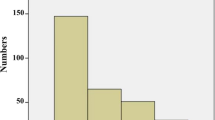Abstract
There is often significant stigma associated with people affected by seizures and diagnosed with epilepsy. The effects of stigmatization in people with epilepsy can often be significant resulting in impaired psychosocial function, isolation, and agoraphobia due to the fear of experiencing seizures, worsening anxiety and depression, and compromised overall quality of life. Patients with drug-resistant epilepsy may be confused with a psychiatric disorder further stigmatizing them. The sophistication of medical and surgical understanding in managing people with epilepsy varies widely in developing countries with limited resources. While history and physical examination is usually helpful to differentiate patients with seizures from other causes such as sleep disorders in people with nocturnal seizures, video-EEG or video-polysomnography with an expanded EEG montage may be necessary to arrive at a definitive diagnosis.
Access this chapter
Tax calculation will be finalised at checkout
Purchases are for personal use only
Similar content being viewed by others
References
Kroner BL, Fahimi M, Gaillard WD, Kenyon A, Thurman DJ. Epilepsy or seizure disorder? The effect of cultural and socioeconomic factors on self-reported prevalence. Epilepsy Behav. 2016;62:214–7.
Bautista RE, Shapovalov D, Shoraka AR. Factors associated with increased felt stigma among individuals with epilepsy. Seizure. 2015;30:106–12.
Shi Y, Wang S, Ying J, Zhang M, Liu P, Zhang H, et al. Correlates of perceived stigma for people living with epilepsy: a meta-analysis. Epilepsy Behav. 2017;70(Pt A):198–203.
Al-Khateeb JM, Al-Khateeb AJ. Research on psychosocial aspects of epilepsy in Arab countries: a review of literature. Epilepsy Behav. 2014;31:256–62.
de Boer HM, Mula M, Sander JW. The global burden and stigma of epilepsy. Epilepsy Behav. 2008;12:540–6.
Author information
Authors and Affiliations
Corresponding author
Editor information
Editors and Affiliations
Rights and permissions
Copyright information
© 2021 Springer Nature Switzerland AG
About this chapter
Cite this chapter
Fine, A.L., Tatum, W.O. (2021). Psychosocial Aspects and Stigma. In: Tatum, W.O., Sirven, J.I., Cascino, G.D. (eds) Epilepsy Case Studies. Springer, Cham. https://doi.org/10.1007/978-3-030-59078-9_50
Download citation
DOI: https://doi.org/10.1007/978-3-030-59078-9_50
Published:
Publisher Name: Springer, Cham
Print ISBN: 978-3-030-59077-2
Online ISBN: 978-3-030-59078-9
eBook Packages: MedicineMedicine (R0)



